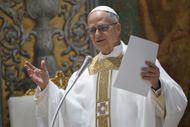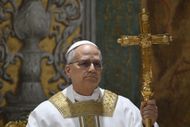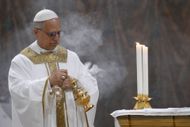On May 8, Cardinal Robert Francis Prevost chose the papal name, Pope Leo XIV. He is the 267th pope of the Roman Catholic Church. He was elected for this significant position, becoming the first American-born pope in the church's history.
Born in 1955 in Chicago as Robert Francis Prevost, his papal name dates back to the late 1800s. Before Pope Leo XIV, the last pope who shared the moniker was Pope Leo XIII. According to People, he was in this prestigious position from 1878 to 1903.
Popes adopt new names upon being chosen, marking a spiritual transformation. In 533 AD, Pope John II was the first-ever pope to change his name, according to the Diocese of Erie.
Born as Mercurius, he chose his papal name to keep pagan connotations tied to his birth name separate. In the following years, this action inspired many popes to change their names.
Everything we know about the tradition of popes taking papal names

In a conversation with People, Dr. Charles Gillespie, Sacred Heart University's Catholic studies professor, reflected on the history of popes adopting new names and Prevost choosing Pope Leo XIV as his papal name.
He said:
"Taking the name of Leo XIV is a clear signal, at least to me, that this guy wants to put moral questions and moral leadership at the center of what the Pope is doing as the leader of Catholics, but also as a thought leader for the world, also a champion for the poor and the underrepresented."
Recalling Pope Francis, the professor further added,
"I think that's a theme from Pope Francis we're going to see continued by Robert Prevost. He also had the job of appointing and helping Pope Francis select the bishops of the world. So he was the person that Pope Francis chose to put in charge of putting the kind of leaders he wanted to see in his church around the globe."

During the conversation, he also shared that Pope Leo XIII was acknowledged as a "great champion of the poor."
A DePaul University professor, Dr. William T. Cavanaugh, reflected on the new pope choosing Leo to add to his papal name. He thought of it as "interesting." He also expressed how it may highlight Pope Leo XIV's relevance and significance in the Church.
While talking about Leo XIII, the professor shared that he
"was also a big promoter of the work of Thomas Aquinas, which indicates a certain kind of openness to other intellectual currents."
He later continued, adding,
"Aquinas was famous for incorporating Aristotelian thought into Christian thought. And so those are some possible directions that the name indicates."

A Vatican journalist, Andrea Gagliarducci, conversed with the outlet to talk about the new pope. Calling him "a very pragmatic person," she shared,
"It shows the name Leo, which is interesting because it marks a discontinuity not only with Pope Francis but with all the last centuries Pope, which means that there is a fresh start."
Initially, many pontiffs continued their responsibilities without a papal name. However, they began following the tradition and changed their names over the years.
A Vatican News report reported that many popes honor their immediate predecessor and take their names as a sign of respect.
The tradition of selecting papal names often follows a way to pay tribute. The Vatican stated that popes
"often chose the names of their immediate or distant predecessors out of respect, admiration, or recognition to mark continuity, but also different names to mark innovation."
Interestingly, history shows that John, Gregory, Benedict, and Pius are the most famous names for popes.
